
How much does bee removal cost? Learn what you’ll pay based on factors like hive location, size of the infestation, extermination or removal, and more.
Pest control costs depend on your project and location. Check with a local pro for your specific job.
Termite inspections cost $100 on average, but you can expect to spend between $75 to $325 for this crucial service. The total cost depends on factors such as home size, infestation location, and the severity of the infestation. Let’s review the cost of termite inspections and when to hire a professional termite exterminator.
Termite inspections cost {{nationalAvgCost}} on average, but you can expect to spend between {{nationalAvgRangeMinCost}} to {{nationalAvgRangeMaxCost}} for this crucial service. The total cost depends on factors such as home size, infestation location, and the severity of the infestation. Let’s review the cost of termite inspections and when to hire a professional termite exterminator.
Check out the most important cost factors to consider when hiring a professional for a termite inspection.
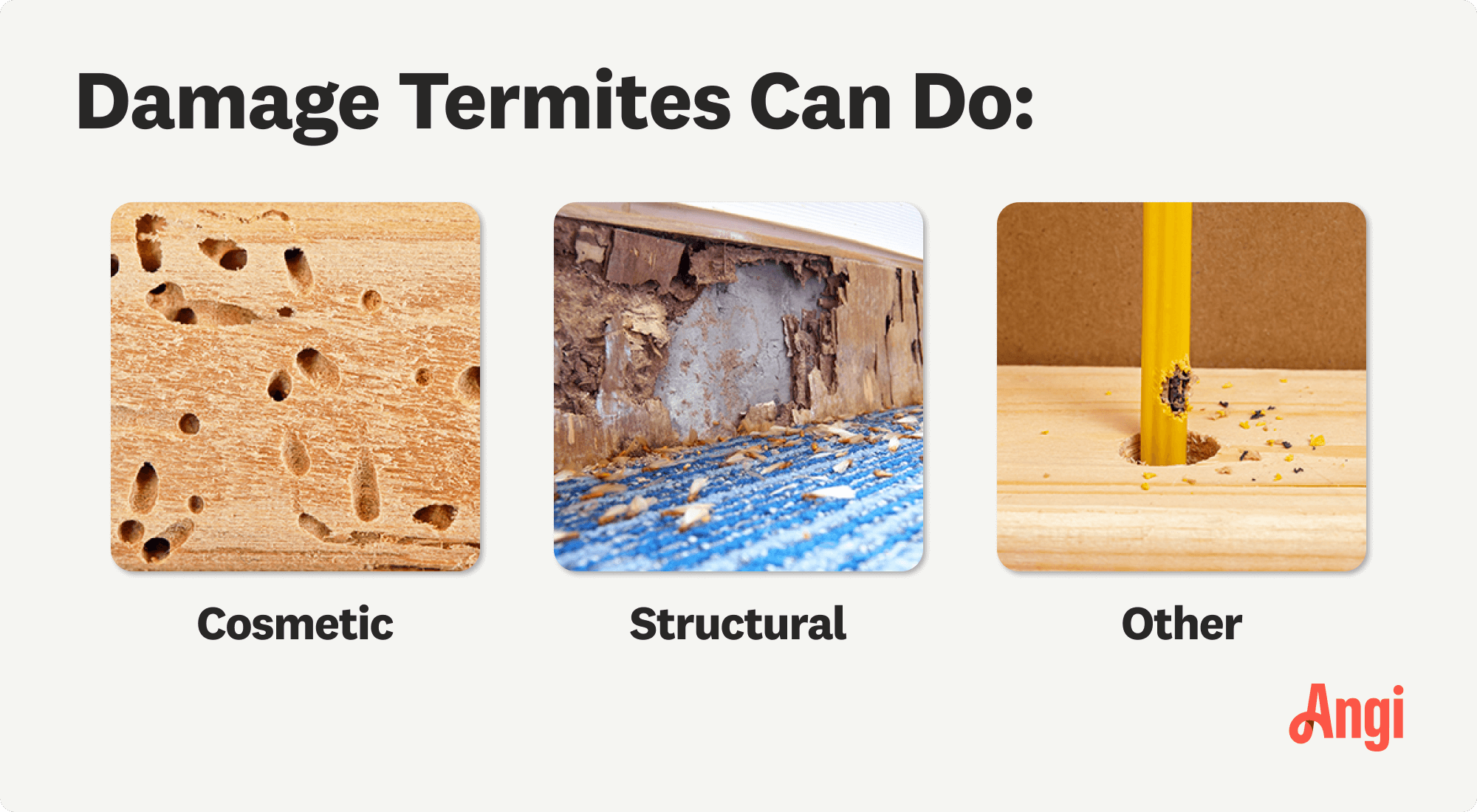
The projected cost of your termite inspection depends on the purpose of the service. Check out common examples and pricing for these termite inspection scenarios.
| Termite Inspection Type | Average Cost |
|---|---|
| Home Sale | $165 |
| Follow-Up | $75–$150 |
| Commercial | $200–$600 |
| Termite Clearance Letter | $100–$200 |
| Termite Bond | $500–$2,000 |
| CL-100 Inspection | $160 |
| WDO Inspection | $150 |
| Inspection Bundles | $250–$400 |
| Termite Report Letter | $150 |
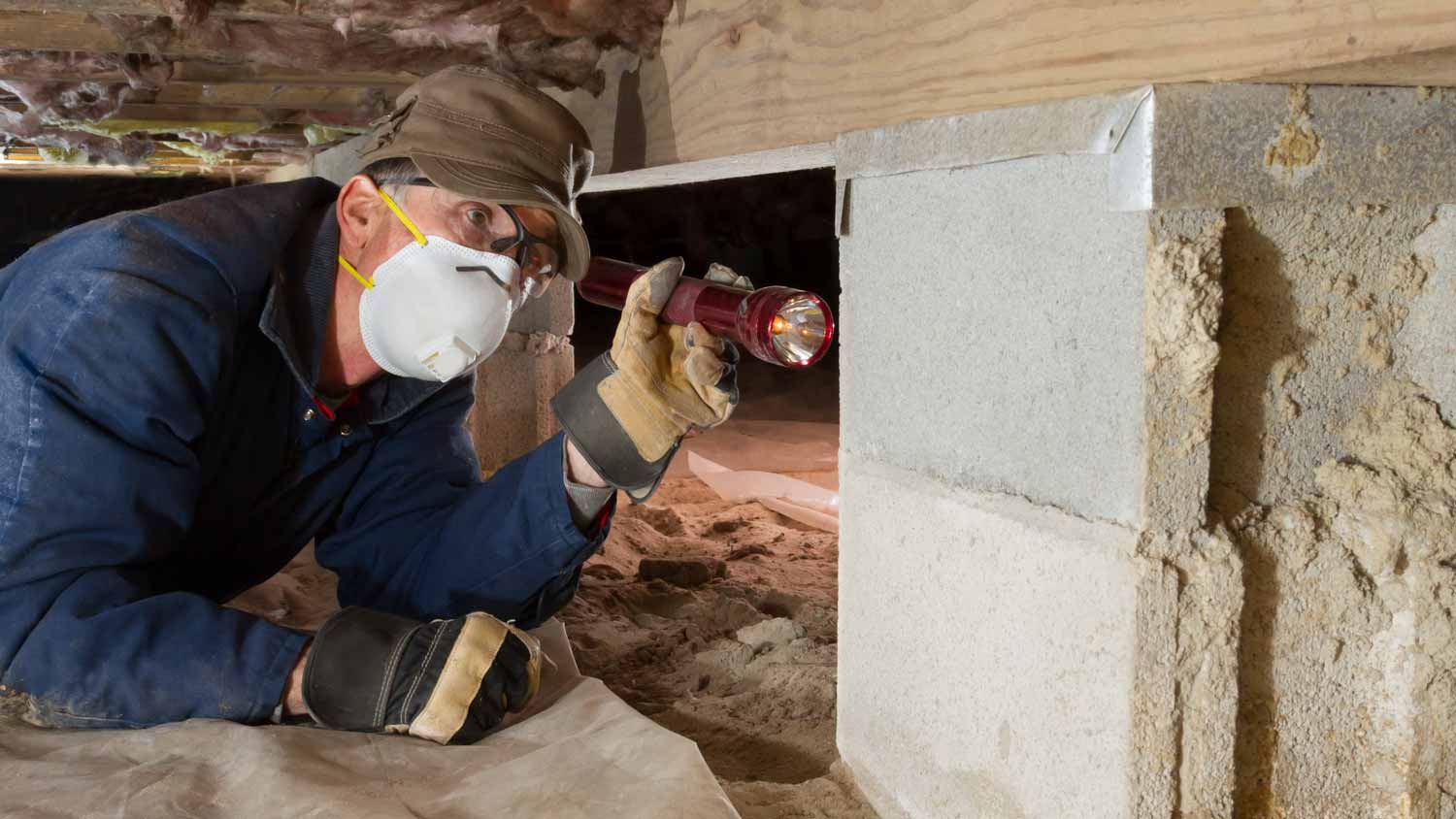
Home sale inspections have an average cost of $165. Check with local regulatory agencies to determine whether the buyer or seller pays for the termite inspection once the house is sold.
In addition to state and county regulations, certain loan types dictate who pays for termite inspections during a home sale.
Standard home loan: With your average regular home loan, the state or county may require a termite inspection and who pays for it. In the vast majority of these cases, the seller pays for the inspection.
Veterans Affairs (VA) loans: This loan type typically requires the seller to pay for the inspection at an average cost of $50 to $150. In rare cases, the VA recommends the buyer or the lender pay. The VA requires termite inspections in “high-risk areas” that have had issues in the past.
FHA loan: The Federal Housing Administration abides by the recommendations of the state or lender, though an inspection is required if the home appraiser finds any evidence of an infestation. The buyer is expected to pay $100 to $200 if you need an inspection.
| Loan Type | Who Pays | Cost |
|---|---|---|
| Standard home loan | Seller | Market average |
| Veterans Affairs (VA) loan | Seller | $50–$150 |
| FHA loan | Buyer | $100–$200 |
Most termite inspections are a one-time occurrence. If you require further inspections to ensure the infestation is completely cleared up, expect to pay $75 to $150 for a new inspection —though this may be at a lower rate if performed by the same company that handled the extermination services.
While most termite inspections are not based on the property's size, size does matter when it comes to commercial property inspections, as these jobs require more time and effort. Whether a restaurant, hotel, apartment, complex, duplex, office building or retail store, commercial termite inspections usually cost more than residential inspections at $200 to $600.
A termite clearance letter is not a document stating that a house is free from pests but instead that it has been inspected and what the inspector discovered. If termites previously caused damage to the home, the letter will also describe what repairs were made. Termite clearance letters are required for certain types of loans and may be a condition for some loans for homes in high-risk areas. Some termite inspection companies may waive the fee for the letter if they are hired for pest control services. Otherwise, you can expect to pay $100 to $200 for a termite clearance letter.
When an inspector uncovers termites in a home, many lenders will require potential buyers to secure a termite bond, which can range from $500 to $2,000. This bond is a contract for termite services wherein the company will perform inspections regularly and treat them for free if they are discovered.
CL-100 inspections only apply to people living in South Carolina. This report works the same as a termite clearance letter but focuses on all wood-destroying insects and fungi rather than only termites. A CL-100 will cost around $160 on average and is only good for 30 days.
WDO stands for wood-destroying organisms and is broader than the CL-100. Lenders may require these inspections if there’s a history of wood damage in the home, and their scope is not limited to South Carolina. The total cost of a WDO inspection is around $150 on average.
Common WDOs include:
Subterranean termites
Drywood termites
Dampwood termites
Wood-boring beetles
Carpenter bees
Soft rot fungi
Brown (dry) rot fungi
White rot fungi
Home inspectors may lack the experience and qualifications to diagnose the presence of termites properly. However, they often partner with professional pest control companies to offer inspection bundles. These bundles include all necessary inspections for a home sale or purchase, including certified pest inspections. Inspection bundles cost $250 to $400 and are a good way to kill two termites with one stone.
A termite clearance letter is the standard report for most lending companies, regardless of whether your home loan is conventional, FHA, or VA. These reports tell the lender that no creepy crawlies are running about your home wreaking havoc. The typical cost of a termite clearance letter is around $150 on average.
You may need to work quickly if your offer is accepted for your future dream home. Some lenders require a report within 30 to 90 days before they can continue with the closing process.
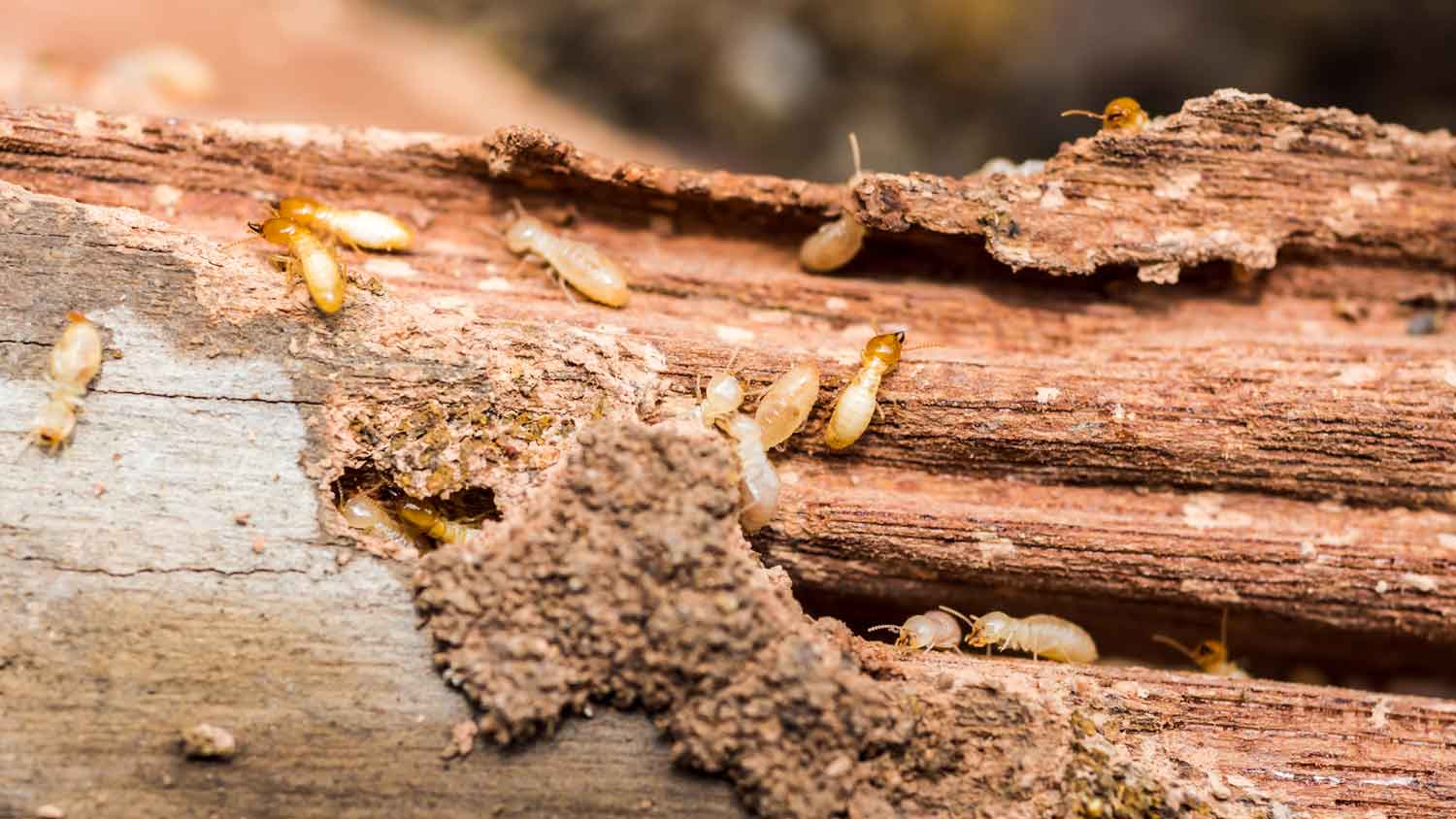
Termite treatment costs around $600 on average, depending on the size and location of the infestation and the type of termite treatment.
However, termite pest control costs range from $230 to $1,000. Large infestations may require more intensive treatments like fumigation, which will cost significantly more than DIY treatments like gel baiting. Fumigation can range anywhere from $1,500 to $8,000.
If your termite inspection finds a small, minor infestation, ask your pest control pro about DIY treatments like bait systems, termiticides, and other methods.
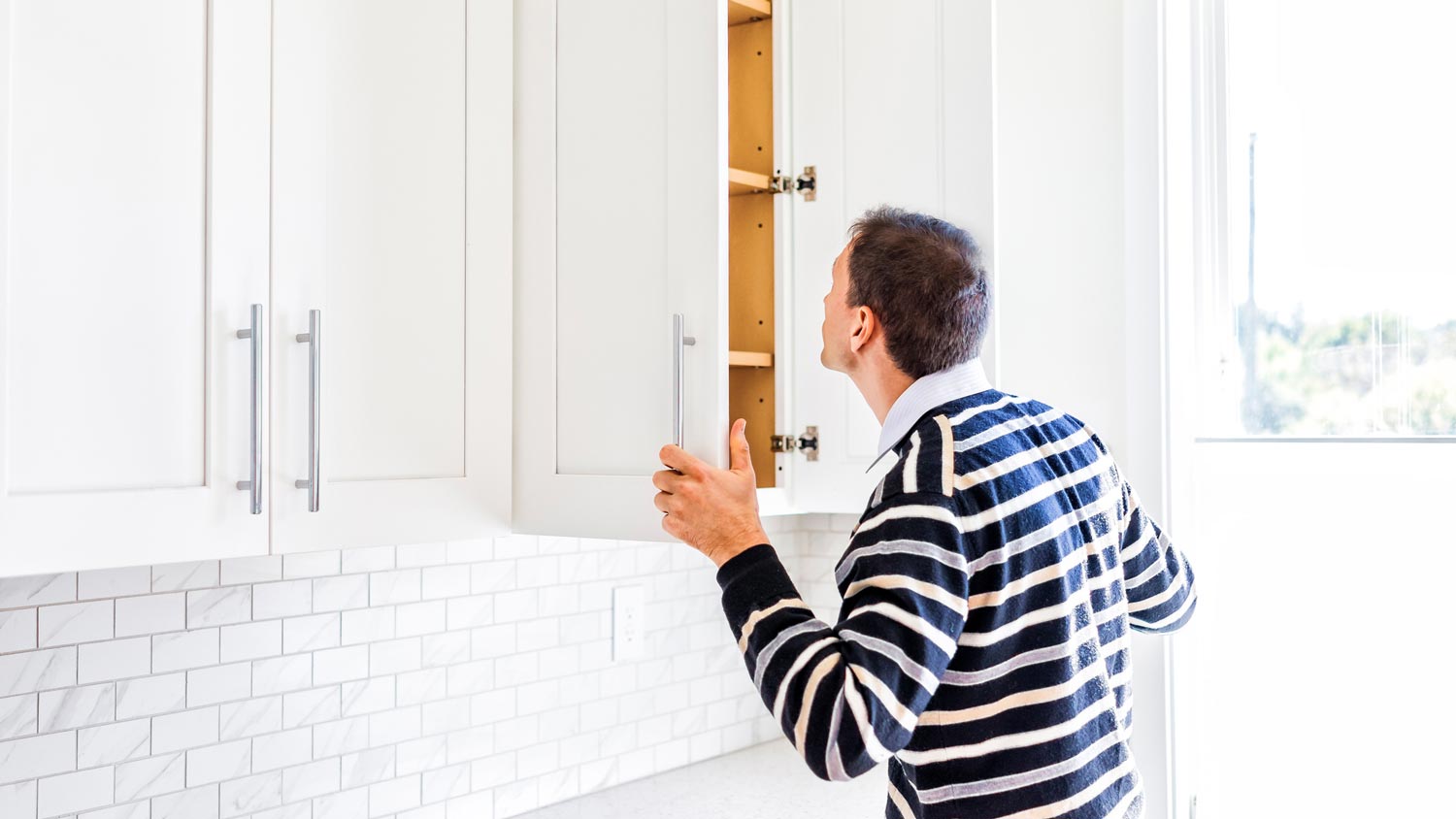
If you’re searching for termite warning signs, there are plenty to keep in mind. Common signs of termite infestations include:
Detached wings throughout the home
Mud tubes
Hollow-sounding wood
Buckled wood
Termite droppings
Small holes in drywall
Bubbling paint
Any damaged wood throughout the home
A termite colony can find its next smorgasbord in any wooden area in your home, necessitating a spot treatment. Common spaces you should check include:
Deck
Fence
Roof trusses
Home exterior
Shed exterior
Kitchen cabinets
Bathroom cabinets
Wood frame
Insect colonies around the yard
Any trees on the property
A termite inspection is an examination of a home performed by a local termite control expert, looking inside and outside the home for signs of an infestation. The professional termite inspector may look in your attic, crawl space, basement, closets, bathrooms, and garage, paying particular attention to any exposed wood in places such as cabinets, baseboards, and door frames. Outside the home, they will also examine cracks in your home exterior and any exposed wood in and around the home, including window frames, wooden fences, and wood piles.
Once you recognize what a termite inspection is, you may wonder if and when you should get one. Generally speaking, most homeowners should get a termite inspection yearly, especially if they live somewhere warm and moist since these areas are at higher risk for infestations.
Aside from yearly inspections, termite inspections are a good idea when you buy a new home. Many states legally require a home seller to pay for a termite inspection before the sale can be completed.
Your local termite inspector will look throughout the interior and exterior of your home to find signs of termite infestations. These signs may be difficult for homeowners to spot, especially if they have had previous infestations and may not know how to distinguish between new and old termite droppings or tunnels.
The inspector may use a probe to look for termite damage in weak-looking areas of the home, including the following:
Areas where wood makes contact with soil
Cracks in foundation
Cracks in stucco
Cracks in exterior and interior paint
Cracks in brickwork
Inspections take about 30 minutes to 2 hours. After they are over, the inspector will show what they have observed to the homeowner, if they are present, and put together a formal report with their findings. If you have an infestation, the inspector will typically recommend eliminating it and repairing any resulting damage.
If you’re getting ready for a professional termite inspection, here’s how to prepare:
Clean the exterior of your home.
Trim tree branches and shrubbery near or touching your home.
Avoid creating excess moisture in your home like mopping or taking a hot, steamy shower.
Make sure that the inspector has easy access to all areas of your home, including the attic, basement, and crawl spaces.
Move any clutter, such as boxes or furniture, away from walls so that the inspector can access all areas.
Clear out the cabinets below your sinks.
Take note of any signs of termite damage, such as mud tubes, wood damage, or discarded wings.
If you have had previous termite inspections or treatments, gather any paperwork related to those services.
Termite inspections make up 64.5% of termite treatment services, followed by one-time extermination. Ongoing protection services, including scheduled visits, account for only about 12% of termite removal services.
Hiring a termite control professional near you to conduct inspections can help you stay ahead of the costly damage these pests can cause to your home. To the untrained eye, spotting an active infestation and understanding just how bad the damage is can be tricky. The cost of an inspection is small in comparison to the hefty repair bill that comes with serious structural issues from termites.
Whether you live in a region prone to termites or have had problems with them in the past, hiring a professional to check for them proactively makes sense. Here’s why:
In some states, inspections by a certified professional are a requirement for home sales.
In termite-prone regions, an inspection can provide peace of mind, especially if your home is older.
Annual inspections often catch infestations before they lead to costly structural damage.
If you’ve had termites before, an inspector can tell the difference between old and new signs of infestations.
Pros have the tools and knowledge to spot signs of infestations that most homeowners would miss.
Inspectors can evaluate the extent of any infestation or damage and make expert recommendations for eradication and repairs.
While a qualified professional is the one with the skills, tools, and certification to carry out a thorough termite inspection, there are a few things you can do ahead of time to make their job easier, faster, and possibly even cheaper. This includes:
Clearing debris and clutter from both the inside and outside of your home so an inspector can access cracks in walls and areas where wood meets soil.
Trimming back tree branches and shrubs that touch or block access to your home’s exterior.
Ensure there’s a clear pathway to your attic, basement, and crawl spaces.
Noting any signs of termites or termite damage to bring to the inspector’s attention.
Gathering paperwork from any past inspections or termite treatments.
Talk about the type of inspection you require, whether that’s a legal report for a home sale, a check for active infestations, or an assessment of existing damage.
Ask if scheduling annual inspection results in a discount.
Check whether there’s a discount if you need control services following an inspection.
Find out what types of termite treatments the company offers and the costs if you plan to use them for ongoing services.
Home is the most important place on earth, which is why Angi has helped more than 150 million homeowners transform their houses into homes they adore. To help homeowners with their next project, Angi provides readers with the most accurate cost data and upholds strict editorial standards. We extensively research project costs to develop the pricing data you see, so you can make the best decisions for you and your home. We rely on reputable sources, including the U.S. Bureau of Labor Statistics, academic journals, market studies, and interviews with industry experts—all to ensure our prices reflect real-world projects.
Want to help us improve our cost data? Send us a recent project quote to [email protected]. Quotes and personal information will not be shared publicly.
From average costs to expert advice, get all the answers you need to get your job done.

How much does bee removal cost? Learn what you’ll pay based on factors like hive location, size of the infestation, extermination or removal, and more.

How much does a gnat exterminator cost? The answer depends on the method of treatment and the level of infestation. Find out what plays into your budget.
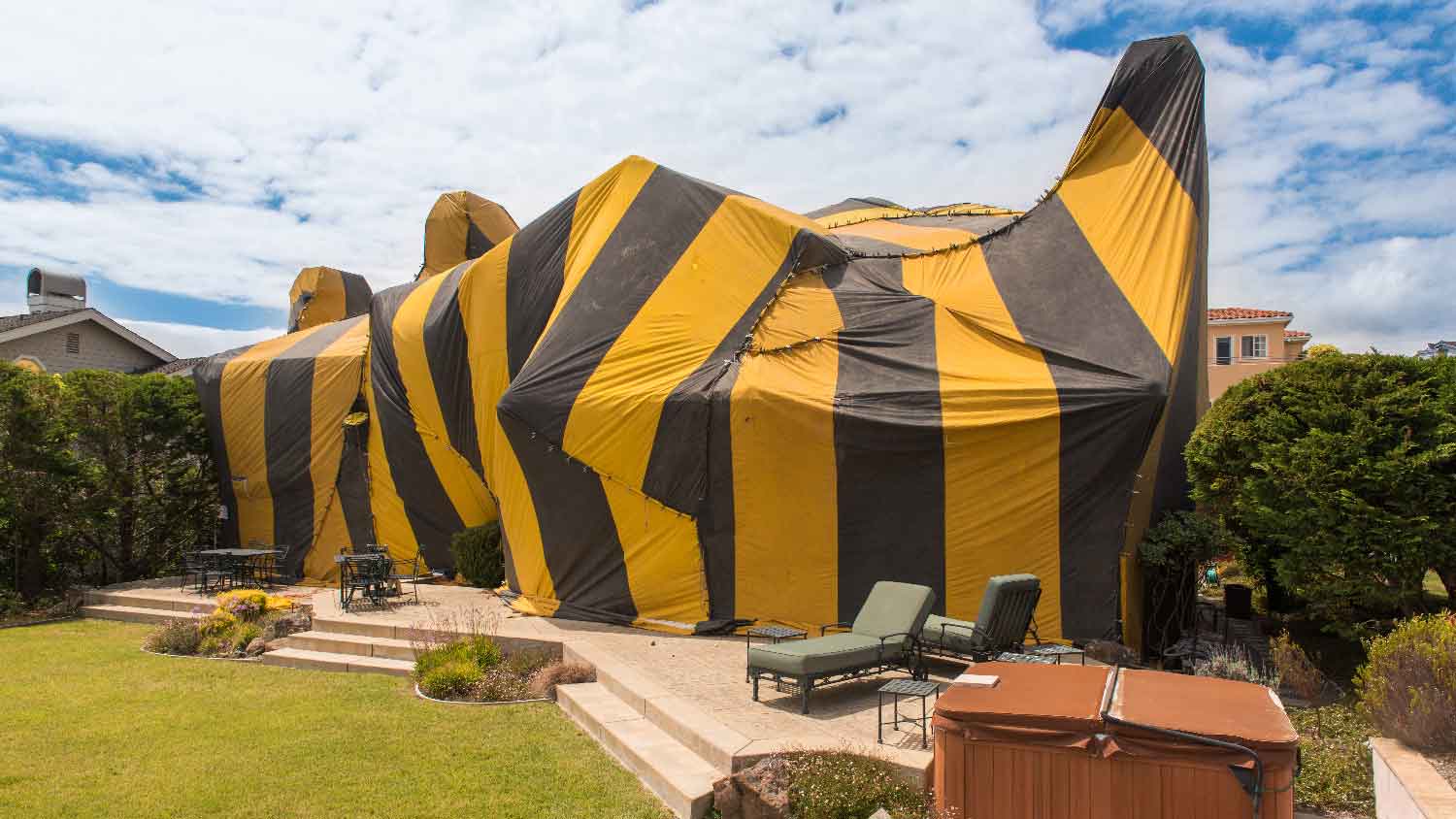
Tenting is a costly but effective way to exterminate termites. Learn the average termite tenting cost and everything that will factor into your budget.

Learn how to check for bed bugs in your home, what to do if you find them, and how to prevent them from returning in this handy DIY guide.

If you have them, then you most likely want to know how to get rid of snakes for good. Here are tips to get them off your property in a humane manner.
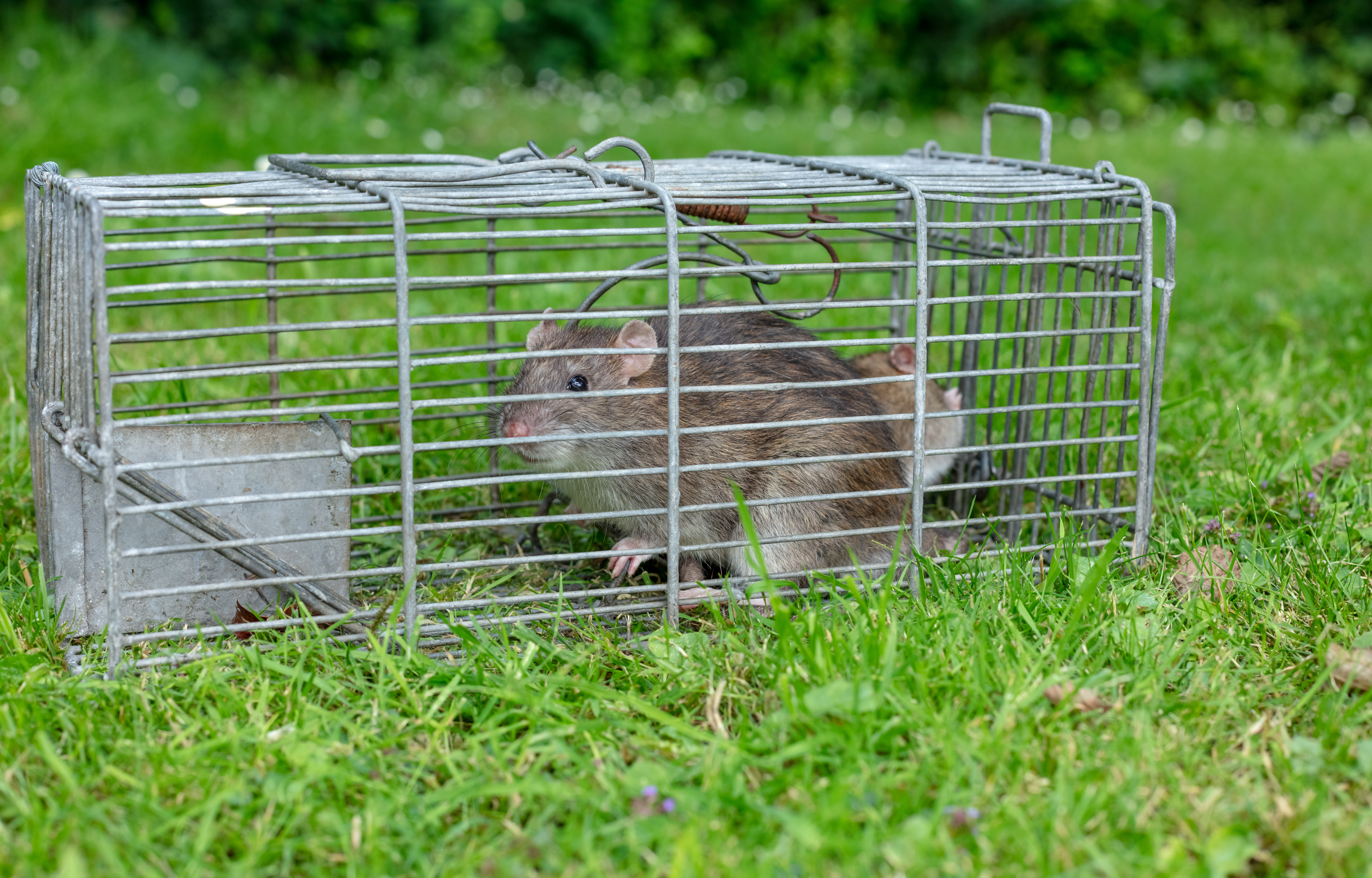
Noticing a growing number of rats calling your yard or garden home? Here are your best options to deal with them.